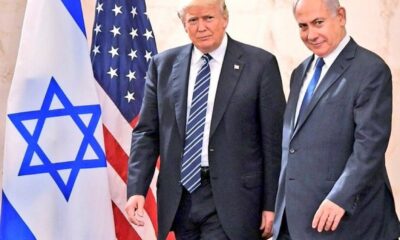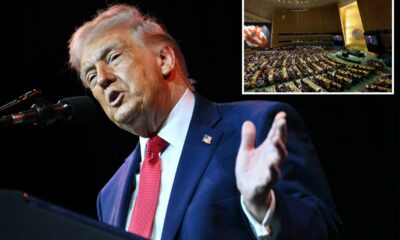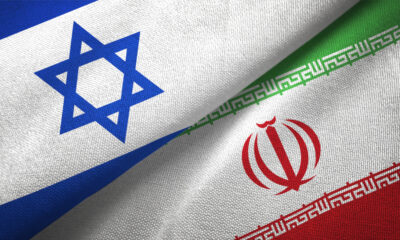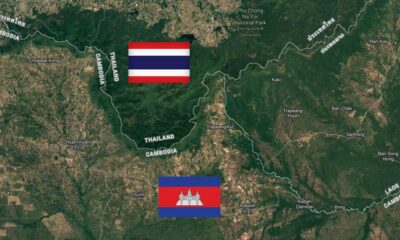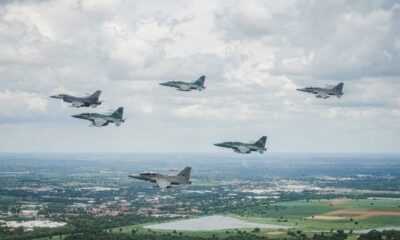News
Missiles, Warnings and Diplomacy on Edge: Israel-Iran Clash Heats Up as Trump Issues Evacuation Alert
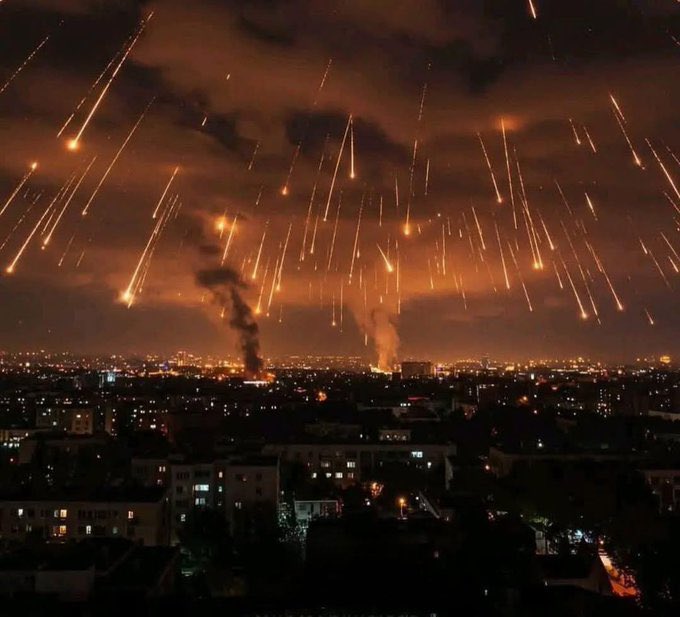
As missiles rain down across borders and diplomacy teeters, South Africans and the world watch with unease.
For five tense days, missiles have lit up the skies over Iran and Israel, leaving devastation, dread, and dire warnings in their wake. The latest comes from US President Donald Trump, who took to his Truth Social platform with a chilling message: “Everyone should immediately evacuate Tehran!”
No further explanation was given, but the timing couldn’t be more alarming. The message followed a new wave of Israeli strikes deep inside Iran, including a targeted bombing of a state television building in the capital.
What Sparked This Escalation?
Tensions between Israel and Iran are nothing new. But what began last Friday has now spiraled into a full-blown missile exchange, with hundreds killed or wounded. Israel kicked off the blitz with a bold aerial campaign targeting Iranian military and nuclear sites—arguing it was acting to prevent Iran from acquiring nuclear weapons.
Tehran responded with wave after wave of retaliatory missile fire. The Iranian Revolutionary Guard vowed the counterstrikes would continue “without interruption until dawn.” For residents of Tel Aviv and Tehran alike, the nights have been long, loud, and terrifying.
Trump Ditches G7, Ramps Up Middle East Warning
Amid mounting global concern, Trump abruptly cut short his appearance at the G7 summit in Canada to return to Washington. The move followed the missile exchange and rising fears of a wider regional war.
Though the US maintains it was not involved in Israel’s initial strikes, Trump’s evacuation call has added fuel to speculation that something bigger may be on the horizon. US forces have shifted to a defensive posture, but the Pentagon has confirmed that the aircraft carrier USS Nimitz is now headed to the Middle East.
The message is clear: Washington is preparing for anything, even if it’s claiming neutrality—at least for now.
Netanyahu: “We Are Changing the Face of the Middle East”
Back in Israel, Prime Minister Benjamin Netanyahu appears undeterred. At a press conference on Monday, he claimed that Israeli forces were “eliminating Iran’s security leadership one after the other.”
He described the offensive as not only a military campaign but a mission to reshape the region—and perhaps even spark political change inside Iran.
“We are changing the face of the Middle East,” Netanyahu said. “And that can lead to radical changes inside Iran itself.”
To date, Israeli authorities report 24 deaths and hundreds of injuries from Iranian attacks. Iranian officials say Israel’s strikes have killed over 220 people, including military leaders, scientists, and civilians.
Diplomatic Channels Close as Bombs Fall
What makes this escalation particularly worrying is that it comes just weeks after quiet diplomatic talks between the US and Iran over the latter’s nuclear programme. Those talks now appear dead in the water.
Iran has made it clear: no more negotiations while under attack.
Foreign Minister Abbas Araghchi was blunt. “Absent a total cessation of military aggression against us, our responses will continue.” He also hinted at a way out, suggesting only Washington had the power to rein in Netanyahu.
“It takes one phone call from Washington to muzzle someone like Netanyahu,” Araghchi posted on X (formerly Twitter).
There are also unconfirmed reports that Trump personally intervened to stop an Israeli plan to assassinate Iran’s supreme leader, Ayatollah Ali Khamenei—an act that would have almost certainly triggered regional war. Netanyahu, however, refused to rule the possibility out when asked by ABC News.
World Watches, Nervously
From Pretoria to Paris, the reaction has been one of mounting concern. Social media is flooded with shock and fear:
“If Tel Aviv is telling people to take cover and Tehran is being bombed, we’re one mistake away from disaster.” — @NewsPulseAfrica
“Diplomacy was working. Why burn it all down now?” — @MiddleEastNow
“Tehran, evacuate? What do they know that we don’t?” — @AnalystZA
In South Africa, where the government has historically supported a diplomatic approach to Iran, there’s unease about what this escalation could mean for global oil prices, regional security, and international alliances—especially amid a fragile global economy.
G7 and China Call for Calm
At the G7 summit, the world’s richest nations issued a joint plea: “de-escalation now.” They affirmed Israel’s right to self-defence but called for a broader peace that includes a ceasefire in Gaza and a firm line against Iranian nuclear ambitions.
China added its voice, urging both Israel and Iran to cool down hostilities and avoid plunging the region into “deeper turmoil.”
But the reality on the ground tells a different story of rockets, rubble, and rising stakes.
The Fallout
With every passing day, the risk of miscalculation grows. A missile here, a strike there, a diplomatic slight—it doesn’t take much to tip a regional conflict into a global one.
Trump’s warning to Tehran may be based on intelligence the public isn’t privy to. Or it may be a strategic bluff. Either way, it’s escalated the urgency and the anxiety.
And for the people in Tel Aviv, Tehran, and everywhere in between, the question remains: how does this end?
{Source: IOL}
Follow Joburg ETC on Facebook, Twitter , TikTok and Instagram
For more News in Johannesburg, visit joburgetc.com

